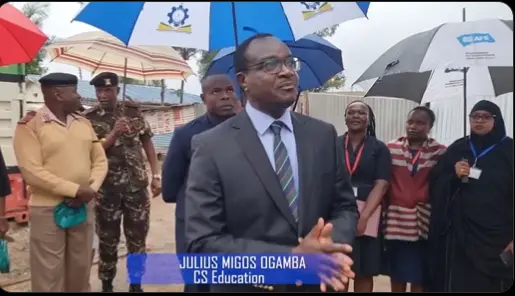At least 965,501 students are sitting their Kenya Certificate of Secondary Education (KCSE) in November 2024, an exam that will enable them to transition to the next academic levels hereafter. Tens of exam malpractice has been taking place on Social media platforms, especially Telegram which was recently hit with temporary ban by the government.
The Ministry of Education, on their part, has been struggling to curb the examination cheating, which is a web of connections—involving center managers or principles, teachers, students, and individuals operating the exam distribution centers.
While supervising the KCSE at the Lang’ata Sub-county Headquarters Office, the Cabinet Secretary for Education, Dr. Julius Migosi Ogamba, threw warning salvos, targeting exam malpractice actors. The CS said serious measures are in place to ensure that only an individual is punished and not the entire school or examination center as it was before.
“Ladies and gentlemen, I’m here to report that we’ve put in place very serious measures to the extent that this year, if there is any exam malpractice, we’re not going to condemn the whole school, the whole center, or the whole number of people who are there. It is going to be an individual.” Dr. Ogamba said.
“Why do I say that? I say that because if, for example, you…or you are moving from here to the schools, you open those examination papers and take a photo, we will know that it is you because you picked it from here. It is individualized, so we will deal with you as an individual,” he added.
A collective punishment will thereafter be weighed upon those deemed to have connived to perpetrate the exam cheating, the CS Dr. Ogamba reiterated.
“Where we find that the whole tam collaborated or conspired to ensure that there is some interference as it happened in Homa Bay, we will then follow the evidence and ensure those involved are going to face the music.”
The government will also apply an available mechanism to detect exam circulation emanating from individual students, using their phones to snap the paper, and thereafter share it with others. Students involved will carry their own cross, not the entire school, the CS added.
“Where we find that a student has taken a phone which has been allowed into the exam room where they take their own paper and send it around, we will know it is that student because each paper is serialized with an individual student. That is the student who then would face the music when the results are being released; it will not be condemning the whole institution because it is individualized.”
“So, I do not want any of us to be caught in that scenario; let us work diligently and follow the guidelines because they are very simple and very clear. If we have agreed that no phones should be in the hall. Keep them aside, whether it is an hour or two hours, then pick after you have finished. It will just save us a lot of trouble,” he added.
CS On Telegram Exam Malpractice Spree
This week, the Communication Authority of Kenya wrote to the mobile network operators, requesting a temporary Telegram shut-down, which would only happen during the administration hours—morning and evening only.
On his side, the CS said that the Telegram group perpetrating the exam malpractice had been arrested and was to be arraigned in court today. However, Dr. Ogamba lamented the investigation and prosecution slackness, which he requested the judiciary expedite to avoid the behavioral repetition.
“The Telegram team that was going on—doing all sorts of things; they were arrested yesterday. They are going to be arraigned today. We have asked the judiciary to assist us to ensure that prosecution is swift and fast so that they face the music. Because even to has been investigation takes too long, prosecution takes too long, and people forget these things had actually happened, so they keep on repeating,” he said.
Penalties for KCSE Exam cheating in Kenya
In Kenya, the penalties for exam cheating vary, and most of the time it takes a collective route, even if selective individuals are found culpable. However, penalties have gone through significant change in recent years, as was announced by the CS today.
The cancellation of results has been the most vigorous punishment slapped on people culpable to have committed the offense. It would extend to repudiating the results of the entire school, affecting even the innocent ones. Individuals or groups in particular will thereafter carry their own cross if found guilty.
However, under the Kenya National Examination Council Act, Chapter 255A, it provides that the council, at its sole discretion, shall cancel the results of candidates of the entire examination center upon satisfying that breach of guidelines or misconduct—leading to widespread irregularities.
The Act also asserts that individuals involved in serious misconduct, such as impersonation, gaining examination materials with the intention of revealing the content, damaging the examination materials, or presenting forged documents, shall be liable to imprisonment for a term not exceeding twelve months or a fine not exceeding five thousand Kenya shillings or both.







